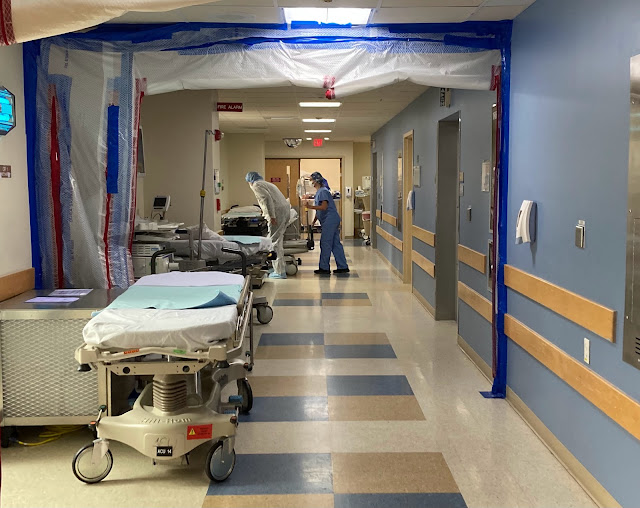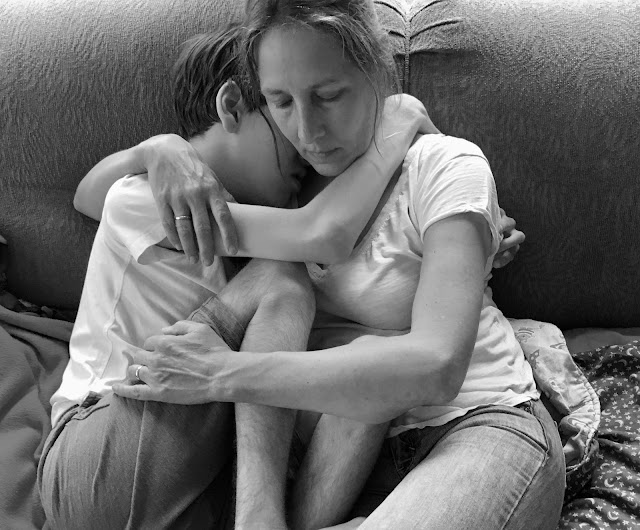Tomorrow morning, Calvin and I will finally make our way to Maine Medical Center for his endoscopic retrograde cholangiopancreatography (ERCP) meant primarily to remove at least one gallstone that is stuck in his common bile duct and which probably caused the excruciating waves of pain and elevated pancreatic enzyme that landed him in the emergency room on New Year's Eve. Calvin has likely needed this procedure for weeks if not months, but it has taken this long to get it on the books because—although every radiologist who read Calvin's CT scans and sonograms reported seeing at least one decent-sized gallstone—one of Calvin's providers wasn't convinced. Eventually, the procedure was scheduled, but then Calvin brought Covid home, and we had to postpone the operation a week.
The ERCP is not technically a surgery. It is an endoscopic procedure during which Calvin must undergo general anesthesia. The gastroenterologist—one of only two in Maine who has the skill to perform this operation—will insert a scope through Calvin's mouth into his esophagus to look for ulcers, etc., then go on to remove the problematic gallstone, perhaps having to widen the common bile duct so it passes more easily.
This will be Calvin's fourth time under general anesthesia. In the past, he has faired well, but the risk of dangerous complications is far worse for someone like him who is neurologically compromised and prone to getting pneumonia which, by the way, he was diagnosed with on New Year's Day. The last time Calvin had to have general anesthesia was last April during surgery for the hip he broke at school (a clean break at the base of the femoral head) when his aides let him walk around by himself and attempt to sit in a chair, which he most regrettably though not surprisingly missed (his vision and coordination are not good).
It is hard to put into words how gut-wrenching and nerve-racking it feels to watch your sweet, nonverbal, cognitively impaired child be wheeled down a hallway with a bunch of strangers into an even stranger room (operating rooms are cold, chrome, sterile places) without any understanding of what is about to happen or why, and without mom or dad by his side to comfort him. To say the experience is worrisome is an understatement. It is the cause of great trepidation.
And so, using the gastroenterologist's patient portal, I wrote to the physician who will be performing the ERCP:
"can i stay with calvin until he goes under general anesthesia?"
The doc replied within minutes, "yes. you can stay with him."
I breathed a sigh of (some) relief.
With any luck, the procedure will go off without any hitches, Calvin will make it safely out from under the anesthesia without aspirating or suffering from too much irritability, and we'll be home sometime tomorrow late afternoon or early evening. Hopefully, Calvin will get some immediate relief from the prolonged pain and discomfort that this gallstone has likely caused him and, hopefully, he'll be protected, at least for a while, from the dangerous sometimes lethal effects that gallstones can cause.
Sadly, Michael cannot join us because it has not yet been ten days (hospital protocol) since his Covid diagnosis, and because he'd miss another day of teaching; I urged him into staying behind. Thankfully, one of my besties, Barbara, is going to drive me and Calvin to the hospital in Portland, and another bestie, Matty, will shuttle us back so I can attend to Calvin's needs on the drive home.
Until then, cross your fingers and toes.
 |
| Michael, in white, escorting Calvin as far as allowed before Calvin's hip surgery last April. |


